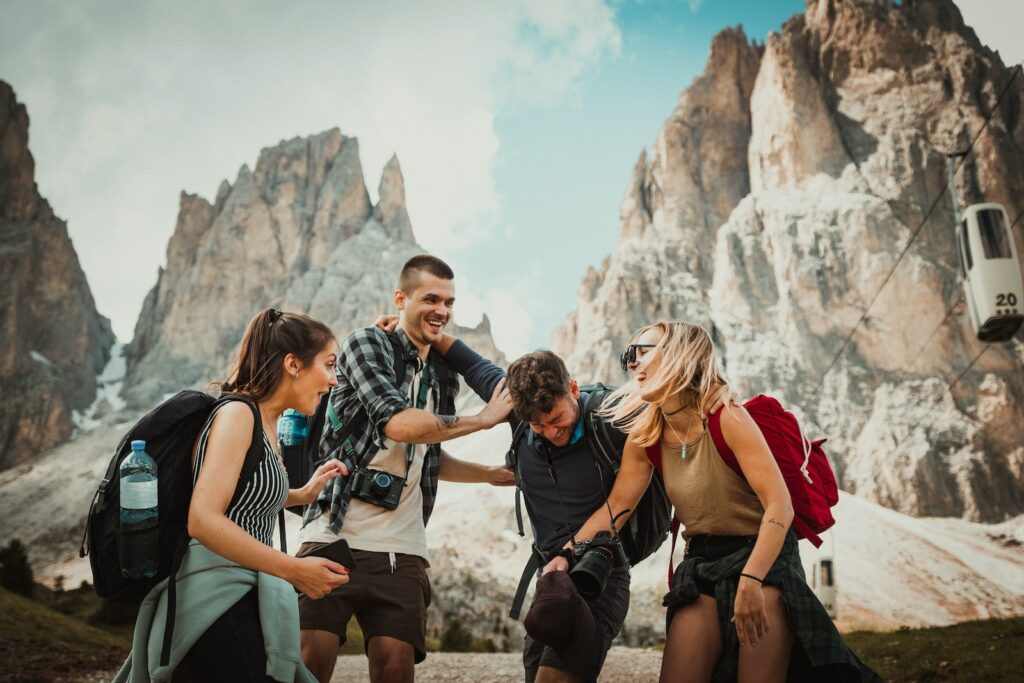Post-graduation travels isn’t just another item on a millennial’s bucket list; it’s an odyssey. An adventure. A chapter in itself. With the world evolving (thanks to good ol’ 2020 and its aftermath), there’s never been a more exhilarating time to plan a gap year or a celebratory trip. So, where’s the roadmap, you ask? Right here, fellow wanderer.
Okay, let’s paint a picture: You’ve just tossed that cap into the sky, hugged a bunch of tearful friends, and, after surviving countless all-nighters, you’re finally holding that degree in your hand. You’re on top of the world, and guess what? It’s time to explore it!
Contents
The Charm of the Gap Year
The allure of a gap year lies in its promise of a pause button on the fast-paced, often relentless journey of life. Just like that moment when you pause Netflix to grab a handful of popcorn, a gap year allows you to hit the brakes on the daily grind and savor the opportunity to explore, learn, and grow in ways that traditional life paths might not readily offer.
One of the key reasons to consider taking a gap year is the sheer length of life’s journey. It’s easy to become engulfed in the demands of academics, career aspirations, and societal expectations, leaving little time to simply be. A gap year represents a strategic timeout, a chance to catch your breath, and gather your thoughts before diving back into the whirlwind of life.
During this interlude, you have the freedom to embark on adventures that you may have never considered otherwise. Travel to distant lands, immerse yourself in new cultures, and experience the world outside of your comfort zone. This is a unique opportunity for personal growth and self-discovery, as you learn to adapt to unfamiliar environments and confront challenges head-on. These experiences can shape your perspective, fostering a greater sense of empathy and understanding towards others.
Learning is another vital aspect of a gap year’s charm. It’s an education beyond textbooks and classrooms. Whether you’re delving into a new language, picking up a skill, or engaging in meaningful projects, your gap year can become a living, breathing curriculum. The hands-on experience and practical knowledge you gain can be invaluable assets when you eventually return to a structured academic or professional path.
Volunteering is yet another facet of the gap year’s appeal. It allows you to give back to communities in need and make a positive impact on the world. This altruistic dimension of a gap year can be deeply fulfilling and enriching, providing a sense of purpose that extends far beyond your own personal growth.
In the larger narrative of your life, a gap year can be the plot twist your coming-of-age story desperately needs. It’s the moment when you break free from convention and forge your own path, even if just for a little while. It’s a chapter of self-discovery, a chance to explore the world, and a period of personal growth. The lessons and memories gathered during your gap year will infuse your life with richness and depth, ultimately enhancing your future endeavors.
So, if you’ve ever wondered why take a gap year, remember that it’s more than just a break; it’s an opportunity to embrace the charm of the unknown, to expand your horizons, and to create a unique chapter in the story of your life. As you pause the regular programming, grab your metaphorical popcorn, and dive into the adventures of your gap year, you might just find that this unplanned detour becomes a pivotal and unforgettable part of your personal narrative. But what about budget?
Budget? No Biggie!
The notion that travel requires a bottomless bank account is a common misconception that often deters individuals from exploring the world. However, the truth is that budget travel can be not only affordable but also incredibly enriching and rewarding. With a little bit of research, a touch of planning, and a pinch of spontaneity, you can embark on adventures that offer unique and meaningful experiences without draining your wallet.
One of the key aspects of budget travel is the art of resourcefulness. Rather than relying on luxury hotels and expensive guided tours, budget travelers often opt for more economical alternatives. For example, backpacking in destinations like Bali has become a popular choice for those seeking adventure on a budget. Bali offers a plethora of affordable accommodations, ranging from budget-friendly hostels to cozy guesthouses, allowing travelers to stretch their funds while enjoying a comfortable stay.
Hostel hopping in Europe is another fantastic example of how budget travel can be both cost-effective and culturally immersive. Europe, known for its rich history and diverse cultures, can be explored without breaking the bank by staying in hostels, which are not only budget-friendly but also provide an excellent opportunity to meet fellow travelers from around the world. This type of accommodation allows you to immerse yourself in the local culture, share stories, and gain valuable insights into the destinations you visit.
Moreover, budget travel encourages a sense of adventure and spontaneity. Instead of meticulously planning every aspect of your trip, you can leave room for serendipity and unexpected discoveries. By avoiding the constraints of expensive pre-packaged tours, you have the freedom to explore off-the-beaten-path destinations, sample street food, and interact with locals on a more authentic level.
Research plays a crucial role in making budget travel successful. Utilize online resources, travel forums, and budget travel blogs to find tips and tricks for saving money on transportation, accommodations, and activities. From finding the best deals on flights to learning about affordable local transportation options, a little research can go a long way in maximizing your travel budget.
Budget travel is not just about spending less; it’s about getting more out of your travel experiences. When you travel on a budget, you may find that you engage more deeply with your surroundings, connect with people from diverse backgrounds, and create memories that are not tied to luxury, but rather to the authenticity of the journey itself.
So, the next time someone suggests that travel is expensive, remember that budget travel is no biggie. With the right mindset and a willingness to explore beyond the usual tourist traps, you can embark on adventures that are not only light on your wallet but also rich in cultural experiences and personal growth. Whether you’re backpacking in Bali, hostel hopping in Europe, or exploring budget-friendly destinations elsewhere, you’ll discover that the world is full of affordable and unforgettable adventures waiting to be explored. Consider travel dynamics 2.0!
Travel Dynamics 2.0
The post-pandemic era has ushered in a new paradigm of travel dynamics, often referred to as Travel Dynamics 2.0. This transformative shift in how we view and engage with travel has been influenced by a confluence of factors, including the normalization of remote work, the rise of digital nomadism, and the reimagining of how we experience different destinations. As a result, the world has effectively become a vast network of hotspots, offering unprecedented opportunities for exploration, work, and personal growth.
- Digital Nomad Visas: Many countries have recognized the potential of attracting remote workers and digital nomads. They have introduced digital nomad visas, which allow individuals to live and work in a foreign country for an extended period. These visas have opened up a world of possibilities, enabling people to experience new cultures, cuisines, and landscapes while continuing to excel in their careers.
- Longer Stays: Travelers are no longer confined to short vacations or hurried sightseeing trips. The post-pandemic traveler often opts for longer stays in a single destination, seeking to immerse themselves in the local way of life. This trend has led to deeper connections with local communities and a more profound understanding of the places visited.
- Work-from-Anywhere Cultures: Remote work has evolved from a temporary necessity to a permanent feature of many industries. This has given rise to a “work-from-anywhere” culture, where individuals have the flexibility to choose where they work. As a result, people are now sending emails from exotic beaches, mountaintop cabins, or cozy cafes in bustling cities, blurring the lines between work and leisure.
- Hybrid Travel: Travel Dynamics 2.0 also promotes the concept of hybrid travel, where work and leisure seamlessly coexist. Travelers can explore new destinations while pursuing their professional goals, creating a harmonious balance between productivity and relaxation.
- Sustainable and Responsible Travel: As travel becomes more accessible and dynamic, there is a growing emphasis on sustainable and responsible tourism. Travelers are increasingly mindful of their environmental footprint and are seeking eco-friendly accommodations, supporting local businesses, and engaging in community-based tourism initiatives.
- Technological Advancements: Technology plays a pivotal role in Travel Dynamics 2.0. From booking accommodations and planning itineraries to accessing remote work tools, travelers are relying on digital innovations to streamline their travel experiences.
- Health and Safety Considerations: The pandemic has heightened awareness of health and safety while traveling. Travelers are more cautious and well-prepared, with a focus on understanding local health protocols and ensuring their own well-being during their journeys.
- Rediscovering Domestic and Offbeat Destinations: While international travel has become more flexible, many travelers are also rediscovering the beauty and diversity of their own countries. Offbeat destinations and hidden gems are gaining popularity, offering unique and less crowded experiences.
In this era of Travel Dynamics 2.0, the world has become a canvas for exploration, learning, and adventure. Whether it’s sending a work email from a beach in Barbados or working remotely while surrounded by the natural beauty of a national park, travelers are redefining the boundaries of what is possible. This evolution in travel dynamics reflects not only a shift in how we work and live but also a profound transformation in how we connect with the world and with ourselves. Sustainability on your mind?
Sustainability? Sign Me Up!
“Sustainability? Sign Me Up!” – this enthusiastic declaration reflects a growing global consciousness and commitment to preserving our planet and leaving a positive impact on the places we visit. In the context of modern travel, sustainability has become more than just a buzzword; it’s a guiding principle that informs choices and actions of responsible travelers.
- Volunteering in Community Projects: One of the most impactful ways to make a difference while traveling is through volunteering in community projects. Whether it’s contributing to reforestation efforts in the Amazon rainforest, participating in local clean-up initiatives, or assisting in educational programs for disadvantaged communities, volunteering provides travelers with the opportunity to give back and leave a lasting, positive imprint on the destination.
- Eco-Stays and Sustainable Accommodations: Conscious travelers are increasingly opting for eco-stays and sustainable accommodations. These establishments prioritize environmental responsibility, implementing practices such as waste reduction, energy conservation, and water efficiency. Staying in such places not only minimizes your carbon footprint but also supports businesses that are committed to sustainable practices.
- Green Transportation Choices: Sustainable travel extends to transportation decisions. Travelers are choosing eco-friendly modes of transport, such as electric or hybrid vehicles, public transit, and cycling, to reduce emissions. Additionally, carpooling and ride-sharing platforms contribute to more efficient use of vehicles, reducing traffic congestion and pollution.
- Mindful Consumption and Local Support: Sustainable travelers are mindful of their consumption habits. They opt for locally sourced products, support small businesses, and avoid single-use plastics. By purchasing locally-made souvenirs and dining at local restaurants, they contribute directly to the economic well-being of the communities they visit.
- Cultural Respect and Preservation: Sustainability isn’t just about environmental concerns; it also encompasses cultural preservation. Responsible travelers respect local customs, traditions, and heritage, striving to leave no negative impact on the cultural fabric of a destination. This fosters a sense of mutual respect and understanding between travelers and local communities.
- Carbon Offsetting and Reduction: Travelers are increasingly aware of their carbon footprint and take steps to offset or reduce it. This might involve participating in carbon offset programs, which fund initiatives like tree planting or renewable energy projects to compensate for emissions generated during travel. Additionally, reducing unnecessary waste, conserving resources, and using eco-friendly products are becoming common practices.
- Educational and Awareness-building Experiences: Sustainable travel often involves seeking out educational and awareness-building experiences. Travelers attend eco-tours, wildlife conservation programs, and nature-based activities that deepen their understanding of the environment and local ecosystems. This knowledge can be shared with others, contributing to a broader sustainability movement.
- Positive Traveler Behavior: Sustainability-minded travelers lead by example, inspiring others to adopt similar practices. They engage in responsible hiking and camping, follow Leave No Trace principles, and advocate for ethical wildlife tourism, promoting a culture of responsible travel within the broader travel community.
Ultimately, the decision to prioritize sustainability in travel is a commitment to being a responsible global citizen. So, what about traveling solo or squad, you can decide!
Solo vs. Squad
The choice between embarking on a solo journey or planning a reunion trip with a group of friends can be a delightful dilemma for travelers. Both options offer unique experiences and advantages, catering to different aspects of wanderlust and human connection.
Solo Journeys:
- Soul-Stirring Adventures: Solo travel is often described as a soul-stirring adventure. It’s a personal journey of self-discovery, introspection, and growth. When you travel alone, you have the freedom to follow your own schedule, explore destinations that truly resonate with you, and make spontaneous decisions without the need for group consensus.
- Independence and Empowerment: Solo travel fosters independence and self-reliance. It encourages you to step out of your comfort zone, make decisions on your own, and overcome challenges with resourcefulness. These experiences can boost your confidence and resilience, making you more self-assured in various aspects of life.
- Deep Cultural Immersion: Traveling alone often leads to deeper cultural immersion. Without the buffer of companions, you’re more likely to engage with locals, learn the local language, and participate in authentic cultural experiences. This can provide a profound understanding of the destinations you visit.
- Flexibility and Spontaneity: Solo travelers enjoy unparalleled flexibility and spontaneity. You can change your plans at the drop of a hat, extend your stay in a place you love, or pivot to new adventures without the need for group discussions or compromises.
Reunion Trips with a Squad:
- Shared Memories and Bonding: Reunion trips with friends, especially with a close-knit group like a university squad, are all about creating and reliving shared memories. These trips offer the chance to reminisce about legendary college misadventures, inside jokes, and the camaraderie that comes with knowing each other so well.
- Strength in Numbers: Traveling with a group provides a sense of security and support. There’s comfort in knowing that you have friends to rely on in case of unexpected challenges, whether it’s navigating a foreign city or simply having someone to watch your bags while you use the restroom.
- Diverse Perspectives: Group travel brings together individuals with diverse perspectives, interests, and backgrounds. This can lead to a more enriching travel experience as you discover new places and activities you might not have considered on your own.
- Cost Efficiency: Group travel can often be more cost-effective, as expenses such as accommodations, transportation, and meals can be shared among the group. This can allow you to splurge on experiences you might not afford as a solo traveler.
- Instant Social Scene: Traveling with a squad means you always have a built-in social scene. Whether it’s for lively conversations around a campfire, impromptu dance parties, or collaborative problem-solving, your friends are right there with you, enhancing the fun factor.
In the end, the choice between a solo journey and a reunion trip with friends depends on your personal preferences, goals, and the type of experience you seek. If traveling is something you definitely will do, think of prepping and planning properly.
Prepping and Planning
Prepping and planning for a trip, whether it’s a short weekend getaway or a long-term adventure, can indeed seem like a daunting task. However, with the right approach, checklists, and digital tools, you can streamline the process and make it much more manageable. Here’s how:
- Visas and Documentation:
- Research Visa Requirements: Start by researching the visa requirements for your destination. Different countries have varying visa policies, so make sure you understand what’s needed well in advance.
- Check Passport Validity: Ensure that your passport is valid for at least six months beyond your planned return date. Some countries may require this for entry.
- Scan Important Documents: Make digital copies of essential documents like your passport, visa, driver’s license, and travel insurance policy. Store these in a secure cloud service or email them to yourself as a backup.
- Health Preparations:
- Consult a Travel Clinic: Depending on your destination, you may need specific vaccinations or medications. Consult a travel clinic or your healthcare provider to stay up-to-date on health requirements.
- Prescription Medications: If you take prescription medications, ensure you have an adequate supply for the duration of your trip and carry copies of your prescriptions.
- Travel Insurance:
- Research Travel Insurance: Explore travel insurance options that suit your needs, including coverage for medical emergencies, trip cancellations, and lost luggage. Compare policies and choose one that provides adequate protection.
- Emergency Contacts: Save important emergency contact numbers, such as those of your insurance provider and the nearest embassy or consulate, in your phone.
- Budget Planning:
- Create a Travel Budget: Outline your expected expenses, including accommodations, transportation, meals, activities, and contingencies. Having a budget helps you manage your finances effectively during your trip.
- Currency Exchange: Familiarize yourself with the currency of your destination and consider exchanging some money before you leave to cover initial expenses.
- Accommodation and Transportation:
- Book Accommodations: Depending on your travel style, book accommodations in advance for the first few nights of your trip. This provides a sense of security, especially if you arrive late at night.
- Transportation: Plan how you’ll get from the airport or train station to your accommodation. Research local transportation options and have maps or navigation apps handy.
- Packing and Essentials:
- Pack Light: Create a packing list to ensure you have all the essentials while keeping your luggage manageable. Consider the climate and activities you’ll be engaging in.
- Travel Adapters: Bring universal travel adapters if you plan to use electronic devices, and check the voltage requirements of your gadgets.
- Travel Apps: Download travel apps for currency conversion, language translation, maps, and local recommendations. These can be invaluable during your trip.
- Itinerary and Reservations:
- Create an Itinerary: Plan a rough itinerary with key attractions and activities you’d like to experience. Leave room for spontaneity and don’t over-schedule.
- Reservations: Make reservations for any tours, activities, or restaurants you’re particularly interested in, especially if they have limited availability.
- Safety Precautions:
- Stay Informed: Stay updated on current events and safety concerns in your destination. Register with your embassy or consulate if recommended.
- Emergency Kit: Pack a basic emergency kit with essentials like a first-aid kit, flashlight, and important medications.
- Communication and Internet:
- SIM Card or Roaming: Decide on your communication strategy, whether it’s getting a local SIM card, activating international roaming, or relying on Wi-Fi hotspots.
- Messaging Apps: Install messaging apps that work over the internet to stay in touch with family and friends.
Remember that while thorough planning is essential for a smooth trip, leaving room for spontaneity can lead to unexpected adventures and discoveries. For some, choosing offbeat over mainstream is important, what about you?
Offbeat Over Mainstream
Choosing offbeat destinations and experiences over mainstream tourist attractions can lead to some of the most memorable and transformative travel adventures. While iconic landmarks like the Eiffel Tower certainly have their allure, exploring less-visited places and embracing unique activities can provide a deeper connection to the world and its diverse cultures. Here’s why opting for the offbeat can make all the difference in your travel experiences:
- Authenticity and Cultural Immersion:
- Genuine Encounters: Offbeat destinations often offer more genuine and intimate encounters with locals. You have the chance to engage with people who may not be accustomed to a constant stream of tourists, leading to more authentic interactions.
- Local Traditions: These less-visited places often preserve their traditional customs and way of life, allowing you to immerse yourself in local traditions and learn about their cultural heritage.
- Escape the Crowds:
- Serenity and Solitude: Offbeat destinations typically offer a respite from the crowds and the chaos of popular tourist spots. You can enjoy the serenity of nature, the tranquility of remote villages, and the solitude of untouched landscapes.
- Uninterrupted Experiences: Without the hustle and bustle of large tourist groups, you can savor the sights, sounds, and experiences at your own pace, uninterrupted by long lines or overcrowding.
- Unique Adventures:
- One-of-a-Kind Activities: Offbeat places often offer unique activities that you won’t find in travel brochures. Dancing under the northern lights in a Finnish igloo, dog sledding in the Arctic, or exploring hidden caves in a remote jungle are just a few examples.
- Personalized Experiences: Smaller, less-visited destinations may provide opportunities for personalized experiences, such as private tours, personalized cooking classes, or bespoke cultural encounters.
- Preservation of Natural Beauty:
- Unspoiled Landscapes: Offbeat destinations often boast unspoiled natural beauty. You can witness pristine beaches, untouched forests, and untouched ecosystems that are still thriving without the impact of mass tourism.
- Environmental Conservation: By choosing offbeat locations, you can contribute to the preservation of fragile environments and support sustainable tourism practices.
- Cost-Effective Travel:
- Affordability: Traveling to offbeat destinations can often be more budget-friendly than visiting popular tourist hubs. Accommodations, dining, and activities may be more reasonably priced, allowing you to stretch your travel budget further.
- Personal Growth and Discovery:
- Self-Discovery: Offbeat travel challenges you to step out of your comfort zone, adapt to new surroundings, and develop problem-solving skills. It can lead to personal growth, self-discovery, and increased self-confidence.
- Unique Perspectives: Exploring less-visited places can offer unique perspectives on the world, broadening your horizons and helping you see the world through a different lens.
- Memorable Stories and Connection:
- Stories to Share: Offbeat travel experiences often result in unforgettable stories and memories that you’ll cherish and share for years to come. These stories become a part of your personal narrative.
- Deeper Connection: By venturing off the beaten path, you may establish a deeper connection with the places you visit and the people you meet. These connections can leave a lasting impact on your life.
In a world where mainstream tourist attractions often dominate travel itineraries, choosing the road less traveled can be a rewarding and transformative decision. So remember to capture, chronicle and cherish those post-graduation trips!
Capture, Chronicle, Cherish
Capture, Chronicle, Cherish” is a mantra that encourages travelers to go beyond superficial snapshots and social media posts to create meaningful, enduring memories of their journeys. By embracing various forms of documentation, such as journaling, raw video recording, and mindful memory-making, travelers can enrich their travel experiences and create valuable keepsakes for years to come.
Journaling Your Experiences:
-
-
- Reflection and Self-Discovery: Keeping a travel journal encourages self-reflection and self-discovery. Through writing, you can articulate your thoughts, emotions, and personal insights about the places you visit, allowing you to understand yourself better.
- Detailed Records: A travel journal serves as a detailed record of your journey. You can document not only the places you visit but also your daily experiences, encounters with locals, and your evolving perspectives throughout the trip.
- Personal Growth: Over time, reading your travel journal can reveal how you’ve grown and changed as a person. It can be a source of inspiration and motivation to continue exploring the world and evolving as an individual.
-
Shooting Raw Videos:
-
-
-
- Capturing Authentic Moments: Raw video recording allows you to capture authentic, unfiltered moments during your travels. These videos provide a more immersive and genuine perspective of your experiences than heavily edited clips.
- Emotional Resonance: Videos have the power to evoke strong emotions and memories. When you revisit your raw travel videos, you can relive the sights, sounds, and emotions of the moment in a way that photos alone often can’t replicate.
- Personal Documentaries: Over time, you can compile your raw travel videos into personal documentaries. These documentaries can become treasured mementos of your adventures and are perfect for sharing with friends and family.
-
-
Mindful Memory-Making:
-
-
- Living in the Moment: Mindful memory-making involves being fully present and engaged in your travel experiences. Instead of being preoccupied with taking the perfect photo, focus on savoring the moment and creating vivid mental snapshots.
- Connecting with Locals: Engage with locals on a personal level. Build connections, listen to their stories, and participate in cultural activities. These interactions can leave a lasting impact and create memories that transcend typical tourist experiences.
- Collecting Mementos: Collect small mementos and souvenirs from your travels, such as postcards, local art, or unique trinkets. These physical reminders can transport you back to the places you’ve visited and the memories associated with them.
-
Value in the Long Run:
-
- Nostalgic Treasure: A decade or more after your travels, the journals, raw videos, and mindful memories you’ve cultivated will be like treasures from the past. They will transport you back to your adventures and provide a sense of nostalgia and appreciation for your experiences.
- Connection with Loved Ones: Sharing your travel stories, journals, and videos with loved ones can bring you closer together. It allows them to vicariously experience your journeys and gain insights into your personal growth and adventures.
- Legacy and Inspiration: Your documented travel experiences can become a part of your legacy, inspiring future generations to explore the world and seek meaningful experiences.
While social media platforms like Instagram have their place in sharing travel moments, the “Capture, Chronicle, Cherish” approach encourages a more profound and lasting connection with your travel experiences. As we conclude, may these tips for post-graduation travels give you inspo!
Finale on Post-Graduation Travels
Post-graduation travels is more than just hopping on a plane. It’s about those tales you’ll narrate endlessly, about metamorphosis, about tasting life in its most unfiltered form. Ready to pen down this chapter? Grab that backpack, plot those maps, and let’s turn the globe into your playground. And who knows? Your story might just be the next viral sensation on social media. All aboard?
FAQs About Traveling After Graduation
Q1. How can I travel sustainably on a tight budget?
Opt for local homestays, use public transportation, and support community-driven initiatives.
Q2. What’s the best way to document my travels?
Journals, vlogs, blogs, or even simple voice notes. Choose what resonates with your style. Remember, it’s your story.
Q3. Is solo travel safe?
Absolutely! But like any adventure, it demands caution. Research, connect with fellow travelers, and always trust your instincts.
Q4. How do I manage work/studies during a gap year?
The world is digital! Remote work, online courses, and flexible gigs have made it easier than ever to blend work, study, and travel.
Q5. What if I’m not sure where to start planning?
Begin with what excites you most. A cuisine, a festival, an adrenaline rush, or even a quiet retreat.






